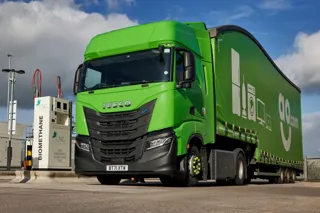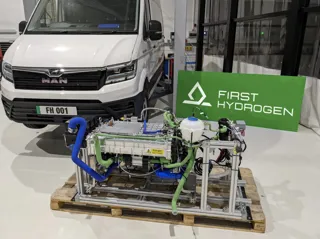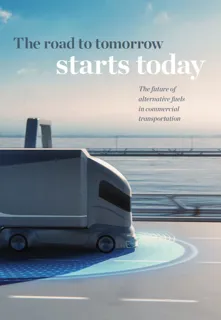By Alison Bell, operations director of Venson Automotive
Governments, businesses and individuals around the world are increasing their efforts to cut carbon emissions and meet new environmental targets, and the transport sector is stepping up to make a big difference.
In the UK, incentives and investment are increasing rapidly, with private and public money now pouring into the research and development of alternative vehicle fuels.
So how do companies decide on the alternative fuels being developed for fleets to consider now, or in the future as part of a future fleet strategy?
The latest data shows the commercial fleet sector accounts for almost a quarter of 23% of energy-related carbon emissions around the world, so, it is unsurprising that the industry is looking into alternative fuel options and not just electric.
The 2030 ban on new petrol and diesel-powered vehicles is fast-approaching, which is accelerating vital innovation in alternative fuel.
However, whilst several alternatives exist, we believe electric gets more than its fair share of the focus as it is not the best option for every driver or every fleet.
There are several friction points for users of electric vehicle (EV) tech which mean that other forms of propulsion could be of greater benefit.
Natural gas and hydrogen are already being used successfully by many different types of fleets, although the infrastructure to support refuelling needs to increase before these will be realistic options for all fleets.
UK infrastructure for the production and distribution of alternative fuels is a long way behind where it needs to be to establish a 100% fossil-fuel free commercial vehicle sector.
But the ramping-up of investment in key areas such as EV charging points, energy production for compressed natural gas and hydrogen hubs suggests that the industry is keen to meet these targets either on, or ahead of schedule, making the UK’s commercial transport sector not just green, but profitable.
To provide fleet managers and businesses with an insight into alternative fuels, Venson has outlined potential areas for growth and drawbacks on fuel options available to fleets today:
|
Fuel Type |
Positives |
Negatives |
|
Electric |
Already a popular option for UK fleets using cars and vans All manufacturers are producing or developing electric fuelled vehicles Government grants available Lower cost of lifetime ownership |
Entire lifespan of a vehicle produces greenhouse gases, from the production to the eventual disposal Not yet viable for HGVs Lack of charging points Mileage range still a barrier For commercial use, EV range remains a problem for all but urban and ‘final mile’ usage |
|
Compressed/liquified natural gas |
More successful than electric for long-distance heavy goods vehicles Low cost of adoption Renewable energy Integrated into the current infrastructure without much trouble |
Only adopted by some manufacturers High cost of production Problematic environmentally as a lot of land would be needed for crop growth, purely to meet the possible demand Whilst carbon neutral over its life cycle, the burning of BioFuel still produces carbon emissions at the point of ignition, which means that it is not seen as a truly ‘clean’ solution |
|
Hydrogen fuel cell technology |
Great alternative fuel source for commercial vehicles. Many local fleets and construction sites are using hydrogen successfully Fewest barriers to adoption, and the most immediately tangible benefits Already three hydrogen powered passenger vehicles on sale to the public H2Accelerate Program, has been set up to initiate a decade-long scale up of hydrogen power in HGVs Government has published a detailed hydrogen strategy, along with a £30 million investment into hydrogen vehicles, supply chains and technology |
Hydrogen gas is scarce and cannot be found in large scale natural deposits Production cost remains high Infrastructure is severely lacking It would still take several years to bring the UK’s hydrogen infrastructure to a level even half-way approaching the current EV infrastructure |
The latest Venson Automotive Solutions white paper explores the current alternative fuels and how they work in the real world.
To help fleet managers consider all green fuel options as they put together their fleet plans for the coming years, the white paper, ‘The road to tomorrow starts today – the future of alternative fuels in commercial transportation’, explains and demystifies electric, natural gas and hydrogen power as fuels for commercial fleet vehicles.
> Interested in comparing electric vehicle data? Check out our EV tool.
> Interested in ensuring the efficient use of EVs. Check out our dedicated editorial sections: Insight & policy | EV news | Charging & infrastructure | Costs & incentives | Benefit-in-kind | EV case studies | EV road tests





















Login to comment
Comments
No comments have been made yet.